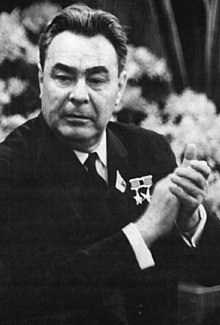Leonid Ilyich Brezhnev
| Leonid Brezhnev Леонид Брежнев |
|
|---|---|

Brezhnev in East Berlin in 1967
|
|
| General Secretary of the Central Committee of the Communist Party of the Soviet Union | |
|
In office 14 October 1964 – 10 November 1982 |
|
| Preceded by | Nikita Khrushchev |
| Succeeded by | Yuri Andropov |
|
Chairman of the Presidium of the Supreme Soviet of the Soviet Union |
|
|
In office 16 June 1977 – 10 November 1982 |
|
| Preceded by | Nikolai Podgorny |
| Succeeded by | Yuri Andropov |
|
In office 7 May 1960 – 15 July 1964 |
|
| Preceded by | Kliment Voroshilov |
| Succeeded by | Anastas Mikoyan |
| Personal details | |
| Born |
Leonid Ilyich Brezhnev 19 December 1906 Kamenskoye, Yekaterinoslav Governorate, Russian Empire |
| Died |
10 November 1982 (aged 75) Zarechye, near Moscow, Russian SFSR, Soviet Union |
| Resting place | Kremlin Wall Necropolis, Moscow |
| Citizenship | Soviet |
| Nationality | Ukrainian |
| Political party | Communist Party of the Soviet Union |
| Spouse(s) | Viktoria Brezhneva |
| Children |
Galina Brezhneva Yuri Brezhnev |
| Residence | Zarechye, near Moscow |
| Profession | Metallurgical engineer, civil servant |
| Awards |
(Full list of awards and decorations) |
| Signature |  |
| Military service | |
| Allegiance | Soviet Union |
| Service/branch |
Red Army Soviet Army |
| Years of service | 1941–1982 |
| Rank |
Marshal of the Soviet Union (1976–1982) |
| Commands | Soviet Armed Forces |
| Battles/wars | World War II |
|
Central institution membership
Other political offices held
Military offices held
The life of Leonid Brezhnev
|
|
Brezhnev Era
Death and funeral
Legacy
Leonid Ilyich Brezhnev (/ˈbrɛʒnɛf/;Russian: Леони́д Ильи́ч Бре́жнев; IPA: [lʲɪɐˈnʲid ɪˈlʲjitɕ ˈbrʲɛʐnʲɪf]; Ukrainian: Леоні́д Іллі́ч Бре́жнєв, 19 December 1906 (O.S. 6 December) – 10 November 1982) was the General Secretary of the Central Committee (CC) of the Communist Party of the Soviet Union (CPSU), presiding over the country from 1964 until his death in 1982. His eighteen-year term as General Secretary was second only to that of Joseph Stalin in duration. During Brezhnev's rule, the global influence of the Soviet Union grew dramatically, in part because of the expansion of the Soviet military during this time. His tenure as leader was marked by the beginning of an era of economic and social stagnation in the Soviet Union.
...
Wikipedia
